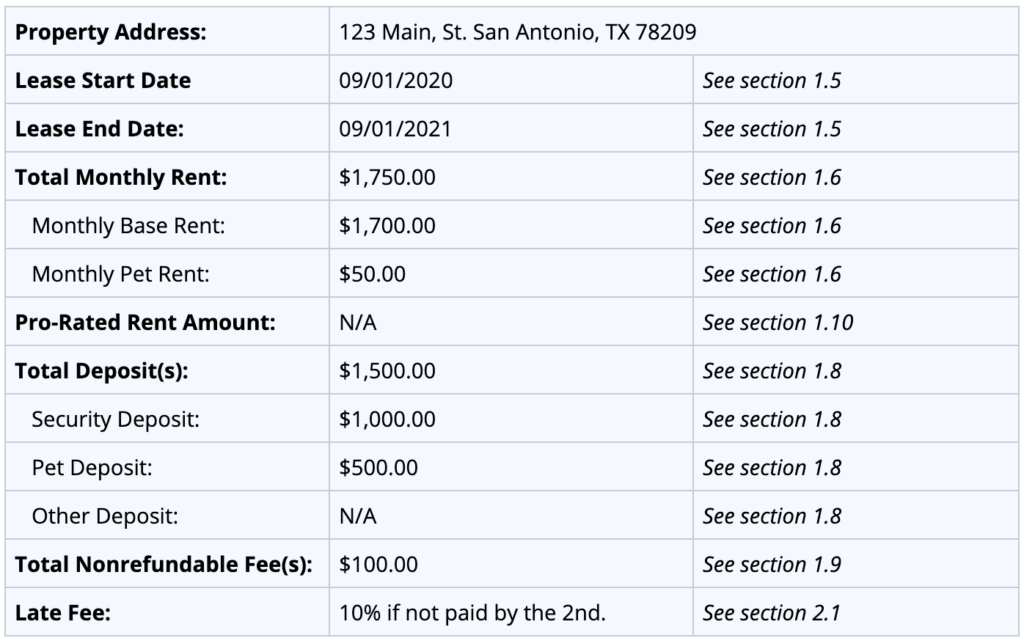Table of Contents
- Texas Renters’ Rights and Landlord Responsibilities
- Texas Landlord’s Rights and Tenant Responsibilities
- Criminal Background Check
- Rental Application Fee Laws
- Security Deposit Updates
- Texas Lease Disclosures
- Texas Lease Agreement
- Texas Landlord-Tenant Law FAQ
- Due Diligence and Landlord-Tenant Laws in Texas
- General Texas Landlord-Tenant Law Resources
Texas is one of the largest states in the U.S. by both size and population, and is home to a number of major cities like Dallas and San Antonio. The state is also becoming an attractive alternative for recent grads and young tech startups within up-and-coming cities like Austin. Paired with the high number of major universities in the area, Texas is an ideal place for landlords to begin investing in real estate.
Curious to learn more about Texas rental applications? Discover how our user-friendly platform can streamline the process and help you navigate the unique requirements across different cities in the Lone Star State. From customizable leases to Texas-specific clauses, find out how we can assist you in creating rental applications that comply with local regulations and protect your property. Take the hassle out of Texas rental applications and gain peace of mind with our comprehensive solutions.
Texas Renters’ Rights and Landlord Responsibilities
- Return security deposit within 30 days
- Tenant is allowed 3 days to move out if evicted
- Tenant may withhold rent in some cases
Though landlord-tenant law in Texas is similar to most other states, there are a few unique laws concerning security deposits, evictions, and lease disclosures.
- Security Deposits – In the state of Texas, landlords are required to return all or some of the tenant’s security deposit within 30 days of tenant move out.
- Small Claims Court – If landlords fail to return security deposits within 30 days, or can’t provide proof of damages leading to a reduction in the deposit, tenants may sue the landlords in small claims court for up to $10,000.
- Rent Withholding – As in most states, renters in Texas may withhold some or all of the monthly rent if the landlord fails to uphold the lease, usually by failing to make necessary repairs.
- Evictions – If a landlord does evict a tenant, the tenant is allowed three days to move out of the unit after being served the unconditional quit notice.
- Lease Disclosure – Landlords are obligated to let tenants know who is authorized to act on the landlord’s behalf, usually as an added section to the lease.
Texas Landlord’s Rights and Tenant Responsibilities
- No security deposit maximum
- May expect tenant to maintain the property
- May evict tenants that do not uphold the lease
Similarly to other states, landlords are protected under the lease terms in Texas. This includes agreements about evictions and upholding the covenant of quiet enjoyment.
- Evictions – Landlords may evict tenants if they do not hold up their end of the lease, most often by engaging in unsafe behavior of failing to pay rent.
- Security Deposits – In Texas, landlords may charge however much they want for a security deposit.
- Respectful Behavior – Landlords may expect their tenants to behave quietly and respectfully so as not to disturb the peace of other tenants.
- Maintain the Property – Landlords can also expect their tenants to take care of the property outside of normal wear and tear.
Criminal Background Check
- HUD (Federal) laws do not classify criminal backgrounds as a protected class, but making a decision to rent based off a criminal background alone could lead to a discrimination charge as it impacts certain protected groups of people disproportionately.
- However, if the criminal background check revealed a crime for the manufacture and distribution of drugs, homicide and/or stalking, denying the application is allowed.
- Landlords should have a consistent and equal policy or procedure in place to follow regarding criminal background checks so as not to discriminate against one class of people over another.
- HUD states that a landlord cannot ask about arrest records, only convictions, as innocent people are commonly arrested though the situation may not have resulted in a conviction.
- Some municipalities may have written their own laws expanding onto what you can and cannot ask regarding criminal backgrounds during the tenant screening process.
Rental Application Fee Laws
There is no cap on application fees in Texas.
Security Deposit Updates
You must return your tenant’s security deposit within 30 days of move out along with the itemization of any lawful deductions.
Texas Lease Disclosures
If your rental property is located within a 100-year floodplain and has a history of flooding in the past five years, you must disclose this fact in your lease agreement.
Parking rules, if any, must be in the lease.
Texas Lease Agreement
There are three sections to a residential lease agreement. The first section outlines the custom details of the contract, such as who’s involved and for what address. Here’s an example Texas lease agreement listing details found in Section 1:
Texas Landlord-Tenant Law FAQ
Below are the answers to some of the most commonly-asked questions when it comes to landlord-tenant laws in Texas.
How Long Does a Landlord Have to Fix Something in Texas?
Landlords typically have one week to make repairs after the notice is received. This is considered by Texas landlord-tenant law to be a “reasonable” amount of time, though the landlord may be able to dispute this depending on the extent of the damages.
Do I Need a License to Rent My House in Texas?
Texas state law does not require landlords to have rental licenses. However, many local jurisdictions do have requirements in place, so it’s important to check your local laws as well. See the links below for a good place to start your research.
Is the Landlord Responsible for Pest Control in Texas?
According to Texas renter’s rights, landlords are required to uphold the “implied warranty of habitability,” meaning that they are responsible for keeping the property habitable. Routine pest control falls under this umbrella. However, tenants should clearly state their pest control requirements in the lease if they have more specific concerns.
Does the Landlord Have to Fix the A/C in Texas?
Under Texas state law, landlords are responsible for fixing anything that threatens tenants’ health or safety. In the sweltering Texas climate, this could well include air conditioning, especially if small children or seniors are living in the unit. Though landlords are not required to provide A/C, they are required to fix it if the unit was leased with the understanding that tenants would have access to air conditioning.
Can I Deny My Landlord Entry in Texas?
Texas landlord-tenant laws do not specify when it comes to landlord access to the unit. Tenants should be sure to review their leases carefully to make sure they agree with the terms, if any, regarding this issue in the agreement. If the landlord is not following the lease terms, such as not giving proper notice before wanting access to the unit, then the tenant may deny them entry.
Due Diligence and Landlord-Tenant Laws in Texas
TurboTenant has utilized many municipal sources along with official state statutes in order to compile this information to the best of our ability. However, local laws are always in flux and landlords and tenants alike should be sure to do their due diligence and consult legal help when it’s needed. We hope the following list can serve as a valuable resource and allow you to succeed as a tenant or landlord in Texas. Be sure to take proper precautions when it comes to finding the top candidates for your unit by utilizing our online rental application and tenant screening services.
Disclaimer: TurboTenant, Inc does not provide legal advice. This material has been prepared for informational purposes only. All users are advised to check all applicable local, state, and federal laws and consult legal counsel should questions arise.

Unlimited Everything.
Create a single Texas lease agreement, or subscribe and receive unlimited lease agreements, landlord forms pack, and e-signs for a simple annual fee. Be confident with all the legal forms and tools you need as a professional landlord.
Discover Our Unlimited PlanGeneral Texas Landlord-Tenant Law Resources
- Landlord Tenant Law – Texas State Law Library
- Tenants’ Rights Handbook
- Landlord Tenant – Provisions Generally Applicable to Landlords and Tenants – Property Code Title 8 Chapter 91
- Landlord Tenant – Residential Tenancies – Property Code Title 8 Chapter 92
- Landlord Tenant – Commercial Tenancies – Property Code Title 8 Chapter 93
- Uniform Condominium Act – Property Code Title 7 Chapter 82
Texas Fair Housing Resources
- HUD in Texas
- Fair Housing Practices – Texas Fair Housing Act – Property Code Title 15 Chapter 301
- Fair Housing for Renters
Federal Fair Housing Resources
- Federal Fair Housing Act
- United States Department of Housing and Urban Development (HUD)
- Civil Rights Act of 1968 (Wikipedia)
Other Texas State Resources
Texas Real Estate Associations
Texas City-Specific Housing Resources
Houston
- Fair Housing – City of Houston
- City of Houston Codes
- Houston Apartment Association
- Houston Association of REALTORS®
San Antonio
- Fair Housing City of San Antonio
- City of San Antonio Code
- San Antonio Apartment Association
- San Antonio Board of REALTORS®
Dallas
- Know Your Rights as a Tenant – City of Dallas
- Fair Housing – City of Dallas
- Dallas Housing Authority
- City of Dallas Code
- Apartment Association of Greater Dallas
- MetroTex Association of REALTORS®
Austin
- Housing Authority the City of Austin
- Austin Tenants’ Council
- City of Austin City Code
- Austin Apartment Association
- Austin Board of REALTORS®
Fort Worth
- Rental Property – City of Fort Worth
- Renter’s Rights and Guidelines – City of Fort Worth
- Apartment Association of Tarrant County – Fort Worth
- Greater Fort Worth Association of REALTORS®
El Paso
- Housing Authority of the City of El Paso
- Fair Housing | El Paso, Texas
- Code of Ordinances | El Paso, TX | Municode Library
- El Paso Apartment Association
- Greater El Paso Association of REALTORS®
Arlington
- Housing- Questions And Answers – City of Arlington, TX
- Fair Housing – City of Arlington, TX
- City of Arlington, TX Codes and Ordinances
- Apartment Association of Tarrant County – Arlington, TX
- Arlington Board of REALTORS®
Corpus Christi
- Fair Housing – City of Corpus Christi
- City of Corpus Christi Codes
- Corpus Christi Association of REALTORS®
Plano
- Plano Housing Authority
- Building Codes & Ordinances | Plano, TX – Official Website
- Code of Ordinances | Plano, TX | Municode Library
- Apartment Association of Greater Dallas
- Collin County Association of REALTORS® – Plano
Laredo
College Station








